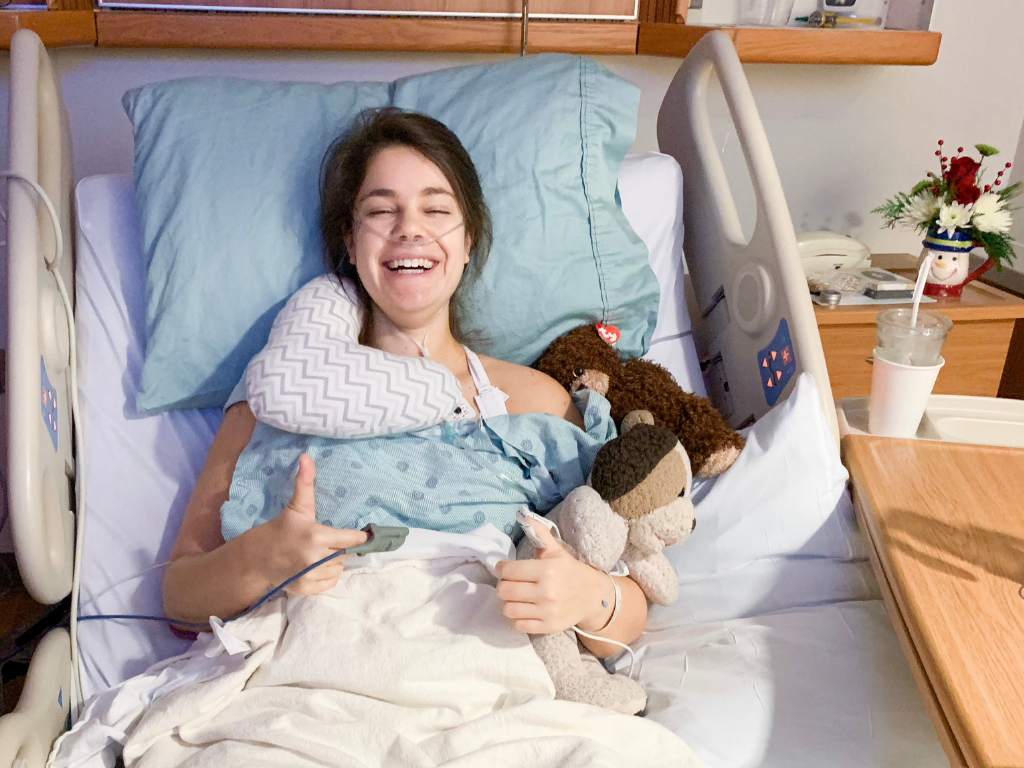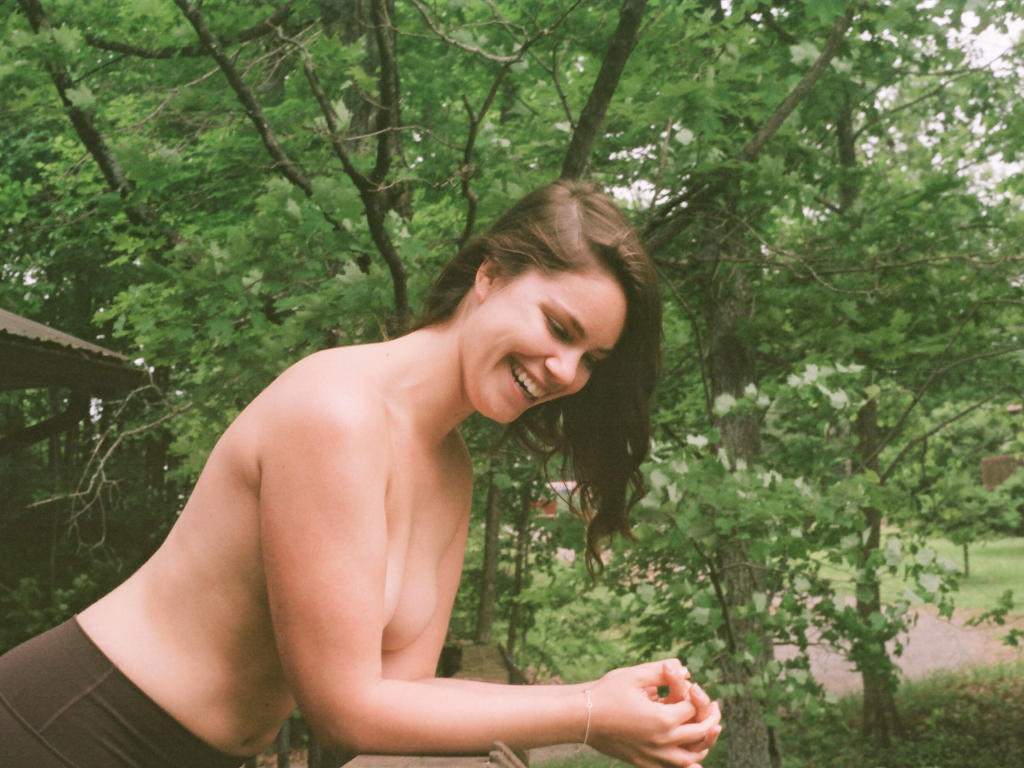I’m 6 days post op from my bilateral prophylactic mastectomy (a fancy ass term for chopping off my tits preventatively) and to say this week has been one of the weirdest and most challenging weeks of my life would be the understatement of the year.
Getting ready for this surgery, I was FREAKING out. I had no idea what to expect and when I searched around the internet to get some // any // kind of answers, I came up hella short.
So here’s my story. In hopes that if you’re searching around frantically like I was, you can find this post and feel less scared shitless and a little less alone. Or maybe you’re just one of my amazeballs readers who never misses a post and always wants to hear about what’s going on in my life, and this has pretty much been my life so here goes.
Fair warning: As always, I don’t keep things super PG and am honest AF about my own personal experience. So here goes...
Extra reminder: This is my personal experience. Everyone I’ve spoken to that has had this procedure has different ones to share. If you are thinking about taking action because you are BRCA +, check out some support groups and speak with other women who have been through this process as well. It was a super important step for me in my journey.
I have to say, in many ways, 2018 felt like the year of before and after — like everything was leading up to this one huge day, December 3rd, when I was finally going to be having my double mastectomy. Which for all you gals out there considering this/or rocking your previvor status already, my surgery was a DTI, OTM bilateral prophylactic mastectomy.
DTI = Direct to implant. I was lucky to be a candidate for a one step procedure for a few reasons, according to my plastic surgeon — 1. I’m young, healthy and fit & 2. I wasn’t looking to go up a cup size. (Often, during the initial surgery to remove the breast tissue, expanders are put in in the place of implants for a few months leading up to a separate exchange surgery when the implants get inserted)
OTM = Over the muscle. This is in reference to where the implant is placed. Over the muscle is a pretty new way of doing things and, because of that, my surgeon was definitely more comfortable with under the muscle, but after speaking to my surgeons and my fellow previvors, I knew that OTM was the right decision for me so I MF advocated for myself and am SO happy that I did.
Bilateral prophylactic mastectomy — double preventative (aka I did/do not have cancer) removal of both breasts.
Anyways, back to the surgery itself. The idea of it scared the living SHIT out of me. I had only ever had one major surgery in my life and it was when I was 19 and got my tonsils removed, but that was something I wanted to do. This? This wasn’t something I would have ever made the decision to do without a good ass reason in my entire life.
I mean, don’t get me wrong, I was never obsessed with my boobs. They were always farther apart than I’d have wanted and shaped a bit like pears (can ya picture it?), but I had never for a second considered getting implants. So many people would say things like “well, silver lining, you get amazing boobs!” — and I never saw it that way because I genuinely didn’t want them. Hell, I seriously considered going flat for a while but didn’t think that would translate well as a 20 something year old who is making a good portion of her career as an actor. Yup, entrepreneur, health coach, speaker and actor bitches! If you’ve been around these parts long enough, you already knew that though.
Anyways, my point is that major surgery was a pretty foreign concept to me. And I imagine it is for you as well. So I’m going to walk you through everything from start to finish with all the nitty gritty details — you ready, lets do the damn thing:
The day of...
My surgery didn’t start until 10:30 AM so I didn’t have to be at the hospital until 9:00. You’re not allowed to eat anything after midnight the night before which I thought would totally suck as I always have 2 breakfasts but my nerves actually killed any appetite I may have had.
Morning of, I got up and took some time for me to journal and do some light yoga which really helped me put me in the right frame of mind. I took a long shower, washed my hair (DO THIS) and rocked my surgical antiseptic wash (mine was called Hibiclens — don’t freak out when you open it and it’s MF magenta colored like I did), drank my required pre surgery apple juice and head to the hospital.
When I got there, I registered and got set up in a private room to do all my pre surgery vitals and get my IV administered. I had to pat down my entire body with these cold wipes before putting on my gown — let me tell ya, the process was hella sexy — and then both doctors came in, chatted with myself and my support squad, and before I knew it, I was given my sleeping cocktail (which led to some seriously hilarious raw video footage of me thinking my body was a bowling ball and the bed’s rails were bumper cars) and whisked away to surgery.
And then I blacked out.
Literally. An entire 6 hours of my day was completely gone. One minute I was holding my husbands finger and the next minute, I was blinking half awake in the ICU saying that I was nauseous, and then blacked out again until I was in my room, surrounded by my support squad, with Coco playing in the background (‘cause they know how much I freaking love Disney).
The rest of my hospital stay was pretty uneventful. I was surprised how low my pain levels were (2/10), I was allowed to have broth and popsicles for dinner (which let me tell ya tasted DAMN GOOD) and I spent the rest of the night/early morning watching movies, dozing on and off, talking with my support squad, taking meds (I wasn’t on any narcotics because they’d administered nerve blocks for the procedure which I was super happy about because my stomach does not do well with narcotics at all) and having my drains cleared by the nurses, who I freaking LOVED. Seriously, my team was incredible. Shoutout to the Northshore team at Evanston Hospital — I couldn’t have been more impressed.
Post op week...
Overall, I’ve gotta say, this experience has been way less taxing than I anticipated. I think the unknown/fears heading into surgery were wayyy harder than anything I’ve experienced post surgery and that was truly surprising to me.
After entertaining the hospital staff with my attempt to dance down the hallways on my evening and morning walk, I got the go-ahead from my doctors that everything was looking good and got discharged from the hospital.
I was a bit sore, almost like I’d done a really intense workout the day before and my shoulders, back & chest were taking the brunt of it, but I was so happy to be home and in my own space. I was allowed to take a shower 2 days post op which was THE BEST THING IN THE ENTIRE WORLD. Seriously, I never thought a shower could feel so good. I definitely was not able to shower on my own though so help is definitely a necessity post surgery. There is no way I would have been able to get by this week if it weren’t for my husband taking time off work to help me through this.
I also saw myself for the first time since before surgery and I was expecting to look like Frankenstein and was SHOCKED at how good the girls looked just 2 days out — they were swollen and puffy for sure but wayyy better than I anticipated. Saw my plastic surgeon for a follow up 5 days post op and he was super impressed too! Everything has been healing well.
The rest of the week has been filled with lots of resting, a few excursions (walks, a trip to target, pedicure, hair wash), watching a shiz ton of movies & tv shows, naps, and hanging out with my mom & dad who came into town for the surgery.
While resting isn’t a state I’m used to being in for too long, and having everyone have to do things for me has been tough, it’s been such a wonderful way to really foster a new found sense of love for my body and everything its capable of. And it turns out, so much beauty happens when you sit back and allow everything to unfold as its supposed to.
I may have never expected to be here. I may have never wanted to have to make this choice. But it’s taught me so much more than I could have ever imagined.
And I know it’ll only continue to do so.
Xo Amanda








